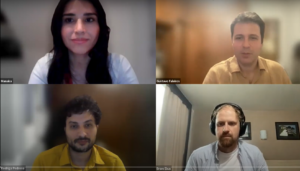To cover criminal dynamics in the Amazon, journalists have to be as smart as the criminals; this is one of the premises under which Amazon Underworld, a cross-border investigation into the criminal networks that run the Amazon, was conducted and published.
Amazon Underworld is a project led by InfoAmazonia, Armando.info and La Liga Contra el Silencio [Network against silence], in collaboration with the Pulitzer Center's Rainforest Investigations Network, and is funded by the Open Society Foundations and the United Kingdom's Foreign, Commonwealth and Development Office.
The team behind the project is comprised of more than 37 journalists and professionals who, between May 2022 and July 2023, mapped the presence of armed groups across the Amazonian borders and conducted a series of in-depth stories on organized crime operations in the region.
"Criminals operating in the Amazon have been able to work, across borders, despite language and cultural barriers. They have managed to forge friendships with their counterparts in other countries and operate as a seamless machine in the Amazon," said Bram Ebus, investigative journalist and 2022 Rainforest Research Network Fellow, during the presentation panel of the investigation.
"In our journalistic efforts to cover the dynamics of crime in the Amazon we had to get as far as the criminals. So the only way to understand these networks was to work as a cross-border team, with the best investigators in different countries, with different languages, different cultural backgrounds, etc," Ebus said.
The Amazon Underworld investigation was published during the first week of August and will continue to be updated with more information throughout the month. The publication was produced in English, Portuguese and Spanish, in order to reach both a local and international audience.
"There is a lot of interest in this type of content from policy makers but also from the general public. We also want our journalism to be accessible to the people of the Amazon region. Although we have a good website, sometimes it can be a bit heavy to load because it has a lot of views. We are thinking of creating some print material that we can distribute and work more with community radio stations and be able to broadcast in the Amazon where there is no Internet or other media platforms," Ebus said.
According to the investigation leaders, each journalist, who ventured into little explored corners of the Amazon, used different journalistic methodologies depending on the country and access.
To gather information on the presence of organized crime structures and armed groups, they conducted interviews with primary sources in the territory, researched documents from state agencies and civil society groups, and submitted requests for information.

Online presentation panel of Amazon Underworld, a project led by InfoAmazonia, Armando.info and La Liga Contra el Silencio (Photo: Screenshot).
The series of investigative stories and maps show the areas of illegal gold extraction, illicit crop cultivation and drug processing, as well as trafficking routes through the heart of the Amazon rainforest.
Specifically, investigators identified the presence of criminal organizations and armed groups in 242 of the 348 municipalities in the Amazon border regions of Bolivia, Brazil, Colombia, Ecuador, Peru, and Venezuela.
"Organized crime takes advantage of the region's porous borders, countless rivers and multiple clandestine airstrips to transport drugs and gold to feed insatiable international markets," the stories explain.
Similarly, the investigation shows how of the 242 municipalities where armed groups are present, several of them coexist or are in dispute over territory in 145. It also shows how the presence of these criminal groups has led to the destruction of protected areas and the invasion of Indigenous territories.
Crime and other illegal activities in the Amazon have become increasingly organized and cross-border. As a consequence, it’s very difficult for local and federal governments to deal with this problem.
During the presentation of the investigation, it was said that, despite the challenges, countries and decision-makers have begun to meet to see how they can work together for the sake of the Amazon region. One example is the recent summit of the Amazon Cooperation Treaty Organization (ACTO), held in the city of Belém, Brazil, on Aug. 8 and 9, after a 14-year hiatus.
Manaka Infante, program officer of Open Society Foundations and one of the speakers at the investigation presentation, shared some key points to address the Amazon problem.
Infante spoke about how law enforcement in these territories is important, but insufficient. According to her, granting economic justice for the people living in the Amazon is a priority.
"We also need to talk about land markets. Ensure that Indigenous territories will be part of the solution. Give rights to those who do not have sufficient access or have no guarantee of access to their lands," Infante said.
On the other hand, for the panelist it is also key to strengthen traditional civil authorities in the Amazon, who have been in charge of providing security in the area for centuries, and to seek alternative solutions in addressing violence.
"We must have protection mechanisms and provide reparations for the victims of these crimes in the Amazon," Infante said. "In Amazon countries, we’ve seen different types of crimes. We have victims of sexual violence. We have victims of human trafficking, etc. A comprehensive strategy should not just prosecute criminals because the problem will repeat itself over and over again."